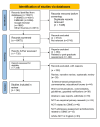Assessment in Undergraduate Competency-Based Medical Education: A Systematic Review
- PMID: 38738047
- PMCID: PMC11088485
- DOI: 10.7759/cureus.58073
Assessment in Undergraduate Competency-Based Medical Education: A Systematic Review
Abstract
Background: Studies that have methodically compiled the body of research on the competency-based medical education (CBME) assessment procedure and pinpointed knowledge gaps about the structure of the assessment process are few. Thus, the goals of the study were to create a model assessment framework for competency-based medical education that would be applicable in the Indian setting as well as to thoroughly examine the competency-based medical education assessment framework.
Methods: PubMed, MEDLINE (Ovid), EMBASE (Ovid), Scopus, Web of Science, and Google Scholar were the databases that were searched. The search parameters were restricted to English language publications about competency-based education and assessment methods, which were published between January 2006 and December 2020. A descriptive overview of the included research (in tabular form) served as the foundation for the data synthesis.
Results: Databases provided 732 records; out of which 36 fulfilled the inclusion and exclusion criteria. Thirty-six studies comprised a mix of randomized controlled trials, focus group interviews, and questionnaire studies, including cross-sectional studies, qualitative studies (03), mixed-method studies, etc. The papers were published in 10 different journals. The greatest number was published in BMC Medical Education (18). The average quality score for included studies was 62.53% (range: 35.71-83.33%). Most authors are from the UK (07), followed by the USA (05). The included studies were grouped into seven categories based on their dominant focus: moving away from a behavioristic approach to a constructive approach of assessment (01 studies), formative assessment (FA) and feedback (10 studies), the hurdles in the implementation of feedback (04 studies), utilization of computer or online based formative test with automated feedback (05 studies), video feedback (02 studies), e-learning platforms for formative assessment (04 studies), studies related to workplace-based assessment (WBA)/mini-clinical evaluation exercise (mini-CEX)/direct observation of procedural skills (DOPS) (10 studies).
Conclusions: Various constructivist techniques, such as concept maps, portfolios, and rubrics, can be used for assessments. Self-regulated learning, peer feedback, online formative assessment, an online computer-based formative test with automated feedback, the use of a computerized web-based objective structured clinical examination (OSCE) evaluation system, and the use of narrative feedback instead of numerical scores in mini-CEX are all ways to increase student involvement in the design and implementation of the formative assessment.
Keywords: assessment; competency based medical education; formative assessment; summative assessment; undergraduate medical education; workplace based assessment.
Copyright © 2024, Gupta et al.
Conflict of interest statement
The authors have declared that no competing interests exist.
Figures
References
-
- Implementing competency-based medical education in family medicine: a narrative review of current trends in assessment. Danilovich N, Kitto S, Price DW, Campbell C, Hodgson A, Hendry P. Fam Med. 2021;53:9–22. - PubMed
-
- Competency-based medical education: theory to practice. Frank JR, Snell LS, Cate OT, et al. Med Teach. 2010;32:638–645. - PubMed
Publication types
LinkOut - more resources
Full Text Sources

